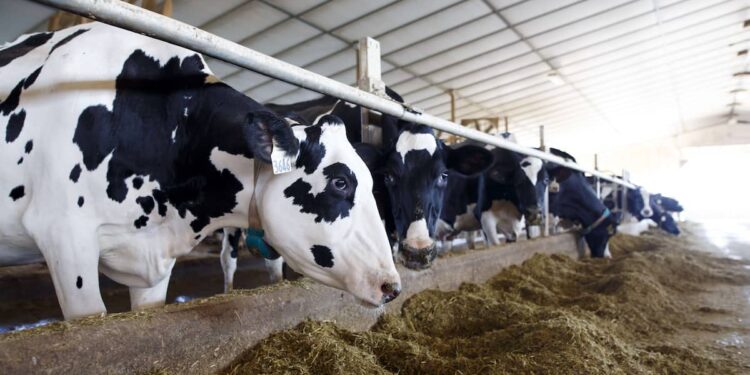Should we be worried after the discovery in the United States of milk contaminated by the H5N1 virus, the cause of avian flu? No, according to experts, who consider that there is very little risk of contamination through food.
• Read also: Traces of H5N1 virus detected in pasteurized milk in the United States
• Read also: (PODCAST) Is bird flu a threat to humans?
What do we know about milk contaminated in the United States by the H5N1 virus?
Traces of this H5N1 virus have been detected in pasteurized cow’s milk in the United States, American authorities said on Tuesday.
During a large national investigation, viral particles were discovered in “milk from affected animals, in the processing system and on the shelves,” announced the United States Medicines Agency (FDA).
How to explain this contamination?
Avian influenza A (H5N1) first appeared in 1996, but since 2020 the number of outbreaks in birds has exploded and an increasing number of mammal species are affected.
Last month cows and goats joined the list, a surprising development for experts because they are not considered susceptible to this type of flu.
“A new H5N1 virus has mixed in the United States with local viruses and has the particularity of multiplying extremely well in the udders of cows,” Jean-Claude Manuguerra, director of the research unit, explains to AFP. and expertise in “Environment and infectious risks” at the Institut Pasteur.
Although the H5N1 strain has killed millions of poultry during the current wave, affected cows have not become seriously ill.
Is there an increased risk of a pandemic today?
“Is finding traces of virus in milk an alarming sign? No, even if the fact that there is an additional animal capable of being infected by this virus, it is not good news,” says Bruno Lina, professor of virology at Lyon University Hospital.
“We risk seeing the appearance of sporadic cases, both in animals and in humans. On the other hand, we are not observing a major modification of the virus which would lead to a higher risk of pandemic than two or three months ago,” he reassures.
Should we be concerned about human health?
An outbreak of avian flu infected a person in Texas in early April, who presented mild symptoms – conjunctivitis – after being in direct contact with a cow.
“What we know is that this virus can cause an infection in humans if it is found in two very specific places: on the conjunctiva of the eye – and it is a mild infection – or at the level of the pulmonary alveolus, deep within the lung,” explains Bruno Lina.
In this second case, the infection can be serious. Of some 900 human cases of H5N1 infection recorded over the past 20 years by the World Health Organization (WHO), half have been fatal.
But the risks appear non-existent in the event of consumption of pasteurized milk where traces of virus have been detected: “pasteurization destroyed the virus even if it does not remove all traces of its presence,” explains Mr. Lina.
In France, the country of cheese and raw milk, is the risk higher?
“Will a person, exposed to unpasteurized milk contaminated with H5N1, develop an infection via the normal milk passage circuit – mouth, digestive tract, etc. -? It has never been shown,” reassures Mr. Lina.
The strain currently circulating in the United States is, in any case, different from those circulating in Europe, recalls Mr. Manuguerra.
Furthermore, there is currently no circulation of this influenza virus among French cattle, he maintains.
“The alert is given, there is particular vigilance and these viruses change so much that we must monitor them, no pun intended, like milk on the stove,” he adds. But “I think that the consumer should absolutely not worry.”



